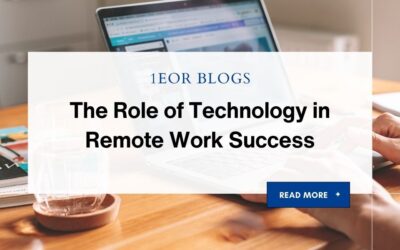The rise of remote work has brought many benefits to organizations, including access to a global talent pool and cost savings. However, it also presents significant challenges, particularly when it comes to data security. Ensuring data security with remote contractors has become one of the most critical aspects of modern business operations. While contractors often bring specialized expertise and flexibility, managing the security of sensitive data they have access to requires vigilance, robust systems, and a clear set of guidelines. This article will explore the various strategies and best practices that companies can implement to ensure data security while working with remote contractors.
Understanding the Risks of Remote Work for Data Security
Remote work offers undeniable advantages, but it also introduces unique vulnerabilities to data security. The primary risk comes from the need to grant contractors access to sensitive business data. Unlike full-time employees who are typically bound by stronger internal security measures, contractors may work from various locations, on different devices, and possibly without the same level of organizational oversight.
Some of the most common data security risks associated with remote contractors include:
- Unauthorized access to sensitive data: Contractors may inadvertently or maliciously access confidential information.
- Weak endpoint security: Contractors may use personal devices with insufficient security measures, increasing the risk of a data breach.
- Lack of secure communication channels: Communication over unsecured networks or platforms can lead to data interception or loss.
- Insufficient training: Contractors may not be fully aware of the best security practices or the importance of protecting data.
Recognizing these risks is the first step in ensuring data security with remote contractors.
Best Practices for Ensuring Data Security with Remote Contractors
The good news is that organizations can take several steps to mitigate these risks. By implementing comprehensive security policies, leveraging advanced technologies, and fostering a culture of security awareness, businesses can protect their data while working with remote contractors. Below are some of the best practices for ensuring data security with remote contractors.
1. Implement Strong Access Controls
One of the first steps in protecting sensitive data is to ensure that only authorized individuals can access it. Access controls are essential for ensuring data security with remote contractors. These controls should be granular and based on the principle of least privilege, meaning that contractors should only be given access to the data necessary for their specific tasks.
- Role-based access control (RBAC): Ensure that remote contractors have access only to the systems and information they need to perform their work.
- Two-factor authentication (2FA): Require contractors to use two-factor authentication for all accounts and systems they access, adding an extra layer of protection.
- Password management tools: Provide contractors with a secure password manager to help them store and manage passwords without resorting to insecure practices.
2. Use Secure Communication Channels
When contractors work remotely, communication is often carried out via email, messaging apps, or video conferencing platforms. Many of these tools are not designed with data security in mind, which increases the risk of sensitive information being exposed or intercepted.
To protect communication:
- Encrypt sensitive communications: Use end-to-end encrypted messaging tools for sharing confidential information.
- Adopt secure file-sharing platforms: Instead of email, which may expose files to hackers, use secure file-sharing platforms with built-in encryption and access control features.
- VPN usage: Encourage remote contractors to use a Virtual Private Network (VPN) while accessing company systems, ensuring their internet traffic is encrypted and secure.
3. Provide Data Security Training
Educating contractors on the importance of data security is essential for creating a security-conscious workforce. Contractors may not be familiar with your organization’s specific data protection protocols, so providing training is crucial. Ensuring data security with remote contractors involves equipping them with the knowledge to avoid common security pitfalls.
Training should cover:
- Data handling protocols: Guidelines on how to store, transmit, and delete sensitive data.
- Recognizing phishing attempts: Contractors should be able to identify and report phishing emails or social engineering attacks.
- Cyber hygiene best practices: Encouraging contractors to update their devices regularly, avoid weak passwords, and be mindful of security threats.
4. Monitor and Audit Contractor Activity
To ensure data security, organizations should continuously monitor and audit the activities of remote contractors. Tracking their access to systems and data can help detect suspicious behavior early and mitigate potential risks.
- User activity monitoring: Use software to track contractor activities within company systems to identify any unusual or unauthorized behavior.
- Regular audits: Conduct regular audits of contractor access logs to ensure that only authorized activities are being performed.
- Automated alerts: Set up automated alerts for any anomalies, such as access to sensitive data outside regular working hours or from an unknown IP address.
5. Use Cloud-Based Security Solutions
Cloud computing can be a double-edged sword when it comes to data security. While it offers flexibility and remote access, it can also expose organizations to new risks if not properly secured. For ensuring data security with remote contractors, leveraging cloud-based security tools can help protect sensitive information.
- Cloud access security brokers (CASBs): These tools provide real-time monitoring of cloud activities, helping to enforce security policies and detect suspicious actions.
- Encrypted cloud storage: Store sensitive data in encrypted cloud environments, ensuring that even if data is compromised, it remains unreadable without the decryption key.
- Zero trust architecture: Adopt a zero-trust security model, where every access request, even from trusted contractors, is verified before being granted.
Ensuring Compliance with Data Security Regulations
When hiring remote contractors, businesses must also consider their obligations under various data protection regulations. Different regions and industries have specific laws that govern how data should be handled, such as the General Data Protection Regulation (GDPR) in the European Union and California Consumer Privacy Act (CCPA) in the U.S.
To stay compliant:
- Review contracts: Ensure that contractor agreements clearly outline their responsibilities for data protection and compliance with relevant laws.
- Regular assessments: Periodically assess your data security measures and contractor activities to ensure they meet the required regulatory standards.
- Data protection clauses: Include clauses in contractor contracts that specify how sensitive data must be protected and the consequences of non-compliance.
Creating a Secure Digital Workspace for Remote Contractors
A secure digital workspace is vital for ensuring data security with remote contractors. By using a centralized, controlled environment, organizations can better manage access to sensitive data and ensure that security protocols are followed.
- Virtual desktop infrastructure (VDI): VDI allows contractors to access a secure, virtualized version of their desktop environment, reducing the risk of data being stored on personal devices.
- Secure collaboration tools: Use collaboration platforms that have built-in security features, such as encryption and access control, to prevent unauthorized access to shared documents and data.
- Mobile device management (MDM): If contractors use mobile devices, implement MDM to control what apps they can access and ensure they comply with security policies.
The Role of Legal Contracts in Data Security
Legal contracts play a critical role in protecting data when working with remote contractors. These contracts should clearly outline the contractor’s responsibilities in terms of ensuring data security with remote contractors.
Key elements to include in a contractor agreement:
- Confidentiality agreements: Ensure that contractors sign a non-disclosure agreement (NDA) to legally bind them to confidentiality regarding any sensitive information they may encounter.
- Data protection clauses: Define specific measures contractors must follow to protect data, including encryption, secure data storage, and safe disposal of information.
- Penalties for non-compliance: Clearly state the consequences of violating data security protocols, including financial penalties or termination of the contract.
FAQs
Why is data security important when working with remote contractors?
Data security is crucial because remote contractors may have access to sensitive information, and without proper security measures, this data can be compromised.
How can I monitor the activities of remote contractors?
You can use activity monitoring software, audit logs, and automated alerts to track contractor activities and detect any unauthorized access.
What are the best tools for secure communication with remote contractors?
End-to-end encrypted messaging apps, secure file-sharing platforms, and VPNs are essential tools for safe communication with remote contractors.
How can I ensure compliance with data protection laws when working with contractors?
By reviewing contracts, including data protection clauses, and conducting regular assessments to ensure compliance with relevant laws like GDPR or CCPA.
What is the role of legal contracts in data security?
Legal contracts outline the responsibilities and penalties for contractors regarding data security, helping to protect sensitive information and ensure compliance.
What is zero trust architecture, and why is it important?
Zero trust is a security model that assumes no user or device is trustworthy by default, requiring verification for all access requests, which helps secure data in a remote work environment.
Can contractors use personal devices to access company data securely?
Yes, but it requires the implementation of strong security measures like endpoint protection, encryption, and the use of secure access controls to mitigate risks.
Conclusion
Ensuring data security with remote contractors requires a multi-layered approach that combines technology, policies, training, and legal protections. By implementing strong access controls, secure communication channels, and monitoring contractor activity, businesses can mitigate risks and protect sensitive data. Additionally, fostering a security-conscious culture and ensuring compliance with data protection regulations will strengthen the overall security posture of an organization working with remote contractors.



